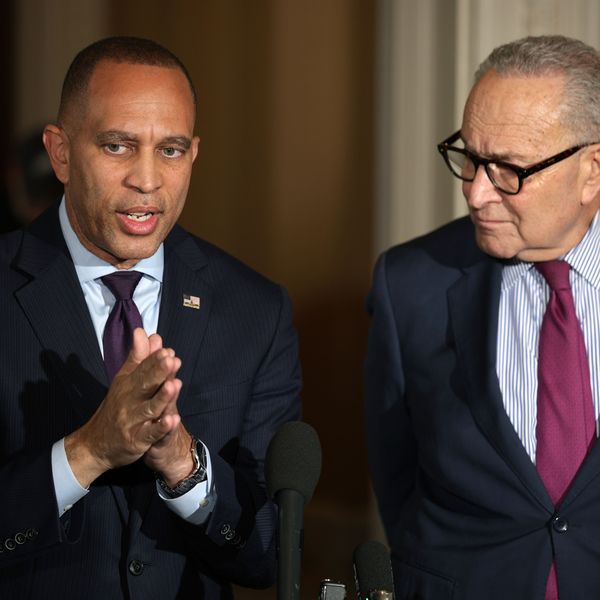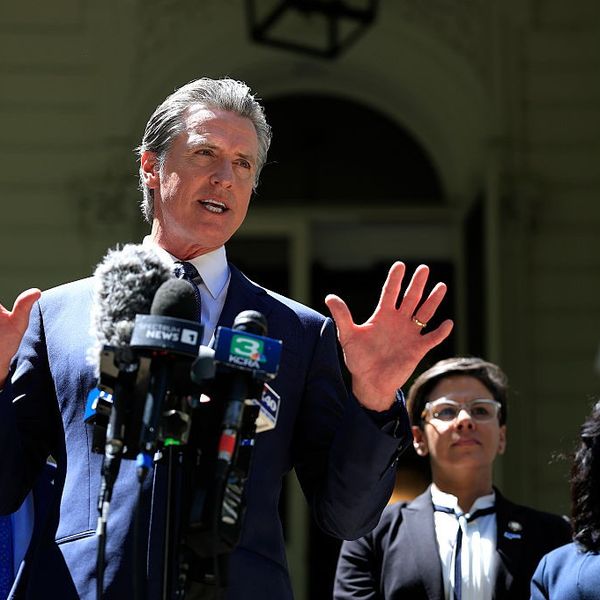
Maya Wiley speaks at the Women of Color Leadership Dinner: Executive Directors Gather on May 26, 2022 in Washington, D.C.
Progressives Praise New US Guidelines for Government AI Use
"Today, the OMB's guidance takes us one step further down the path of facing a technology-rich future that begins to address its harms," said Maya Wiley.
U.S. Vice President Kamala Harris announced on Thursday a Office of Management and Budget guidance regarding how the federal government will utilize new artificial intelligence tools going forward, and it received praise from some progressives.
The guidance focuses on how federal agencies can benefit from utilizing AI tools but also the risks involved in putting them to use.
"The order directed sweeping action to strengthen AI safety and security, protect Americans' privacy, advance equity and civil rights, stand up for consumers and workers, promote innovation and competition, advance American leadership around the world, and more," says a White House fact sheet.
At the first-ever Global AI Summit last year, I laid out our vision for a future where AI advances the public interest.
To help build that future, I am announcing our first government-wide policy to promote the safe, secure, and responsible use of AI. https://t.co/6NPXLWn8Oc
— Vice President Kamala Harris (@VP) March 28, 2024
The guidance says all federal agencies will now have a senior leader in charge of the use of AI tools, agencies will have to publicly report how they're using AI, agencies will be required to create "concrete safeguards" to protect the rights of citizens, and more.
Damon T. Hewitt, president and executive director of the Lawyers' Committee for Civil Rights Under Law, called it "a significant step to implement meaningful safeguards on the government's use of artificial intelligence."
Maya Wiley, president and CEO of the Leadership Conference on Civil and Human Rights, said it's necessary to make sure technology "serves us," rather than "harms us," and it should "advance our democracy rather than disrupt it."
"Today, the OMB's guidance takes us one step further down the path of facing a technology-rich future that begins to address its harms," Wiley said. "The guidance puts rights-protecting principles of the White House's historic AI Bill of Rights into practice across agencies, and it is an important step in advancing civil rights protections in AI deployment at federal agencies. It extends existing civil rights protections, helping to bring them into the era of AI."
The Biden administration released an AI Bill of Rights blueprint in 2022, which is an outline for how new AI tools should be utilized and developed to protect consumers. It also secured a voluntary AI safeguard agreement with seven major AI developers in July of last year.
An Urgent Message From Our Co-Founder
Dear Common Dreams reader, The U.S. is on a fast track to authoritarianism like nothing I've ever seen. Meanwhile, corporate news outlets are utterly capitulating to Trump, twisting their coverage to avoid drawing his ire while lining up to stuff cash in his pockets. That's why I believe that Common Dreams is doing the best and most consequential reporting that we've ever done. Our small but mighty team is a progressive reporting powerhouse, covering the news every day that the corporate media never will. Our mission has always been simple: To inform. To inspire. And to ignite change for the common good. Now here's the key piece that I want all our readers to understand: None of this would be possible without your financial support. That's not just some fundraising cliche. It's the absolute and literal truth. We don't accept corporate advertising and never will. We don't have a paywall because we don't think people should be blocked from critical news based on their ability to pay. Everything we do is funded by the donations of readers like you. Will you donate now to help power the nonprofit, independent reporting of Common Dreams? Thank you for being a vital member of our community. Together, we can keep independent journalism alive when it’s needed most. - Craig Brown, Co-founder |
U.S. Vice President Kamala Harris announced on Thursday a Office of Management and Budget guidance regarding how the federal government will utilize new artificial intelligence tools going forward, and it received praise from some progressives.
The guidance focuses on how federal agencies can benefit from utilizing AI tools but also the risks involved in putting them to use.
"The order directed sweeping action to strengthen AI safety and security, protect Americans' privacy, advance equity and civil rights, stand up for consumers and workers, promote innovation and competition, advance American leadership around the world, and more," says a White House fact sheet.
At the first-ever Global AI Summit last year, I laid out our vision for a future where AI advances the public interest.
To help build that future, I am announcing our first government-wide policy to promote the safe, secure, and responsible use of AI. https://t.co/6NPXLWn8Oc
— Vice President Kamala Harris (@VP) March 28, 2024
The guidance says all federal agencies will now have a senior leader in charge of the use of AI tools, agencies will have to publicly report how they're using AI, agencies will be required to create "concrete safeguards" to protect the rights of citizens, and more.
Damon T. Hewitt, president and executive director of the Lawyers' Committee for Civil Rights Under Law, called it "a significant step to implement meaningful safeguards on the government's use of artificial intelligence."
Maya Wiley, president and CEO of the Leadership Conference on Civil and Human Rights, said it's necessary to make sure technology "serves us," rather than "harms us," and it should "advance our democracy rather than disrupt it."
"Today, the OMB's guidance takes us one step further down the path of facing a technology-rich future that begins to address its harms," Wiley said. "The guidance puts rights-protecting principles of the White House's historic AI Bill of Rights into practice across agencies, and it is an important step in advancing civil rights protections in AI deployment at federal agencies. It extends existing civil rights protections, helping to bring them into the era of AI."
The Biden administration released an AI Bill of Rights blueprint in 2022, which is an outline for how new AI tools should be utilized and developed to protect consumers. It also secured a voluntary AI safeguard agreement with seven major AI developers in July of last year.
- World's Artificial Intelligence Experts Sign Pledge Aimed at Averting 'Dystopian Future With Robots Flying Around Killing Everybody' ›
- 'AI Will Not Scab Us': Post-Gazette Newsroom Decries Use of Artificial Intelligence ›
- Landmark Artificial Intelligence Act in EU Slammed as Rights 'Failure' ›
- Biden Urged to Crack Down on 'Terrifying' Use of AI by Medicare Advantage Insurers ›
U.S. Vice President Kamala Harris announced on Thursday a Office of Management and Budget guidance regarding how the federal government will utilize new artificial intelligence tools going forward, and it received praise from some progressives.
The guidance focuses on how federal agencies can benefit from utilizing AI tools but also the risks involved in putting them to use.
"The order directed sweeping action to strengthen AI safety and security, protect Americans' privacy, advance equity and civil rights, stand up for consumers and workers, promote innovation and competition, advance American leadership around the world, and more," says a White House fact sheet.
At the first-ever Global AI Summit last year, I laid out our vision for a future where AI advances the public interest.
To help build that future, I am announcing our first government-wide policy to promote the safe, secure, and responsible use of AI. https://t.co/6NPXLWn8Oc
— Vice President Kamala Harris (@VP) March 28, 2024
The guidance says all federal agencies will now have a senior leader in charge of the use of AI tools, agencies will have to publicly report how they're using AI, agencies will be required to create "concrete safeguards" to protect the rights of citizens, and more.
Damon T. Hewitt, president and executive director of the Lawyers' Committee for Civil Rights Under Law, called it "a significant step to implement meaningful safeguards on the government's use of artificial intelligence."
Maya Wiley, president and CEO of the Leadership Conference on Civil and Human Rights, said it's necessary to make sure technology "serves us," rather than "harms us," and it should "advance our democracy rather than disrupt it."
"Today, the OMB's guidance takes us one step further down the path of facing a technology-rich future that begins to address its harms," Wiley said. "The guidance puts rights-protecting principles of the White House's historic AI Bill of Rights into practice across agencies, and it is an important step in advancing civil rights protections in AI deployment at federal agencies. It extends existing civil rights protections, helping to bring them into the era of AI."
The Biden administration released an AI Bill of Rights blueprint in 2022, which is an outline for how new AI tools should be utilized and developed to protect consumers. It also secured a voluntary AI safeguard agreement with seven major AI developers in July of last year.
- World's Artificial Intelligence Experts Sign Pledge Aimed at Averting 'Dystopian Future With Robots Flying Around Killing Everybody' ›
- 'AI Will Not Scab Us': Post-Gazette Newsroom Decries Use of Artificial Intelligence ›
- Landmark Artificial Intelligence Act in EU Slammed as Rights 'Failure' ›
- Biden Urged to Crack Down on 'Terrifying' Use of AI by Medicare Advantage Insurers ›

